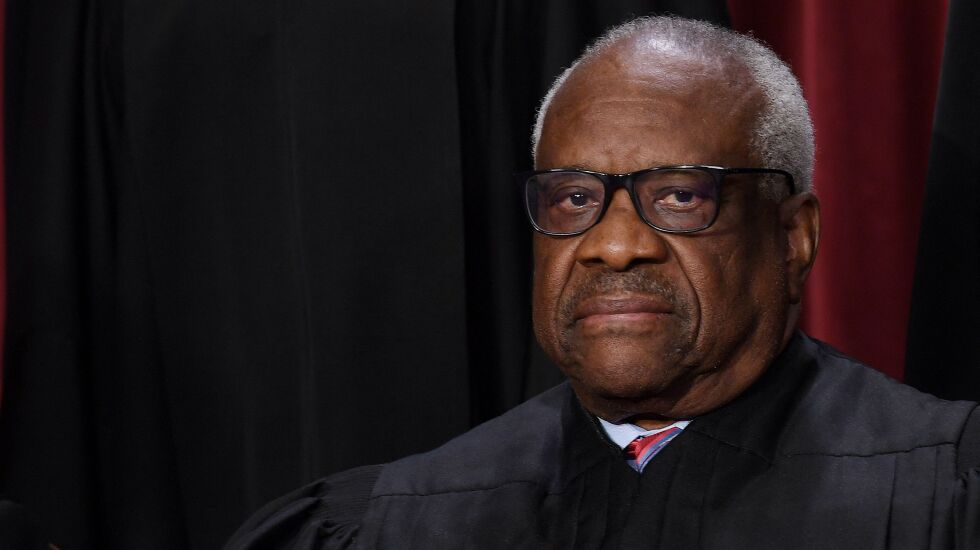
Remember the Operation Greylord scandal, when 17 Cook County judges were indicted in the 1980s for taking bribes and other ethical lapses? Today, any of those Cook County judges who are still around probably are wishing they had been sitting instead on the U.S. Supreme Court, where the oversight appears to be significantly more lax.
According to a report from ProPublica, U.S. Supreme Court Justice Clarence Thomas for more than two decades took undisclosed globe-trotting luxury trips that were hosted or paid for by Harlan Crow, a Dallas businessman who also is big-time Republican donor. Think about that the next time you read about an unpaid suburban library or park trustee who’s being criticized for inadvertently leaving something minor off an economic disclosure form. Some ethics law experts say Thomas violated federal disclosure rules.
At the least, Thomas ought to have openly fessed up to those fabulous favors right from the start. If Thomas cared about the appearance of conflict of interest, he wouldn’t have gone on those trips at all or would have insisted on paying for them. How odd — inexcusable really — for someone on the public payroll as a Supreme Court justice to telegraph the message: The appearance of impropriety doesn’t matter.
This wasn’t about accepting a small memento, like a nice pen set. A 2019 trip to Indonesia that included flights on Crow’s jet and cruising aboard his super yacht could have cost Thomas and his wife, Virginia “Ginni” Thomas, more than $500,000 if they had paid for it themselves, ProPublica said, adding that Clarence Thomas has accepted luxury trips from Crow virtually every year. Oh — and in 2011 it was reported Crow gave half a million dollars to a Tea Party group Ginni Thomas founded that paid her a $120,000 salary.
”That is probably more money than all of the [Greylord] judges took combined,” Robert Warden, co-author of a book about Greylord, told us. “It is stunning. It is horrendous.”
Crow told ProPublica that no one along for the posh junkets tried to lobby Thomas on issues before the court, which, let’s face it, is a narrow definition of influence. On Friday, Thomas said early in his tenure he got the go-ahead from unnamed colleagues and others in the judiciary. We’d like to see documentation showing whether anyone from whom he sought advice foresaw that Thomas would apply it to annual lavish vacations with a top Republican donor, including cruises on a mega-yacht.
Influence for the mega-wealthy?
Crow’s and Thomas’ excuses miss the point. Millions of ordinary Americans are affected every year by decisions the court makes. Such hitherto undisclosed special treatment for a justice might make them wonder if they have been getting fair consideration on issues that pit their interests against those of the mega-wealthy. Lawyers who argued cases before the court might be wondering if their carefully crafted legal points had less influence than free opulent vacations.
U.S. Sen. Dick Durbin, D-Ill., is not buying the excuses. He said Thomas’ behavior has been “simply inconsistent with the ethical standards the American people expect of any public servant, let alone a justice on the Supreme Court,” and he said the Senate Judiciary Committee, which he chairs, will take action. If nothing is done, what excesses might future justices deem are appropriate?
“In terms of what you might call the written rules of judicial ethics, the Supreme Court has exempted itself,” said Northwestern University Law Professor Emeritus Steven Lubet, an expert on judicial ethics who has long called for a Supreme Court code of conduct. “The problem with voluntary compliance is ... you can interpret it however you want.”
The revelations about Thomas come at a bad time for the public image of the nation’s higher courts. The millions of partisan dollars that just poured into a race for a Wisconsin Supreme Court seat, for example, make it hard to remember an era when Republican Illinois Sen. Charles Percy persuaded former President Gerald Ford to appoint lifelong liberal George Leighton to the U.S. District Court in Chicago. And then there’s the abhorrent example of former President Donald Trump saying outright he would appoint justices to overturn Roe v. Wade, which his appointees did.
Back in 1969, U.S. Supreme Court Justice Abe Fortas was nominated to be chief justice, but his appointment was filibustered, and he later resigned because of a retainer from a Wall Street financier, which he returned; speaking fees at American University; and his close ties to then-President Lyndon Johnson. Apparently, standards have loosened since then.
More recently, the late Justice Antonin Scalia cheerfully took hunting trips with people who had interests in cases before the high court, which seems to have helped create a laissez-faire attitude about ethics for a court that basically monitors itself. The revelations about Thomas add to the court’s substantial credibility woes.
We know of judges who won’t let anyone pick up the tab for lunch. Supreme Court justices should hold themselves to the highest ethical standards in the land. It’s a test Clarence Thomas has failed.
We welcome letters to the editor and op-eds. Check out our guidelines for both.
Send letters to letters@suntimes.com







